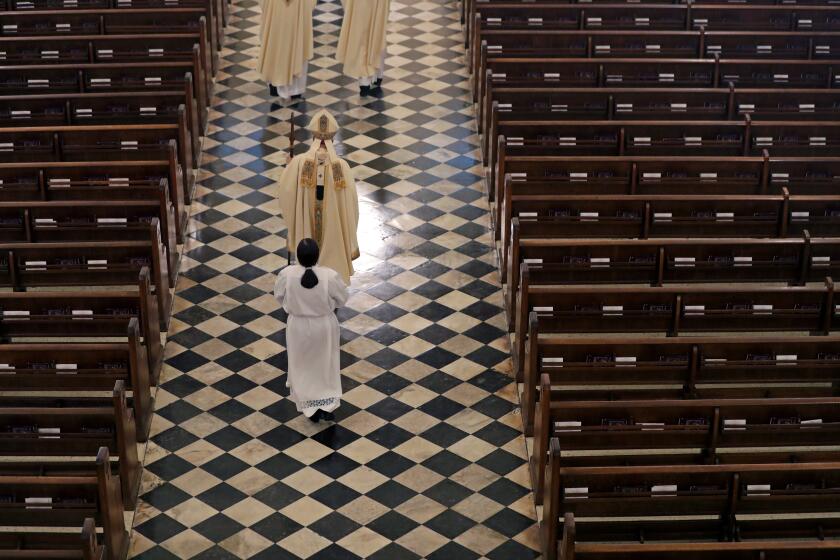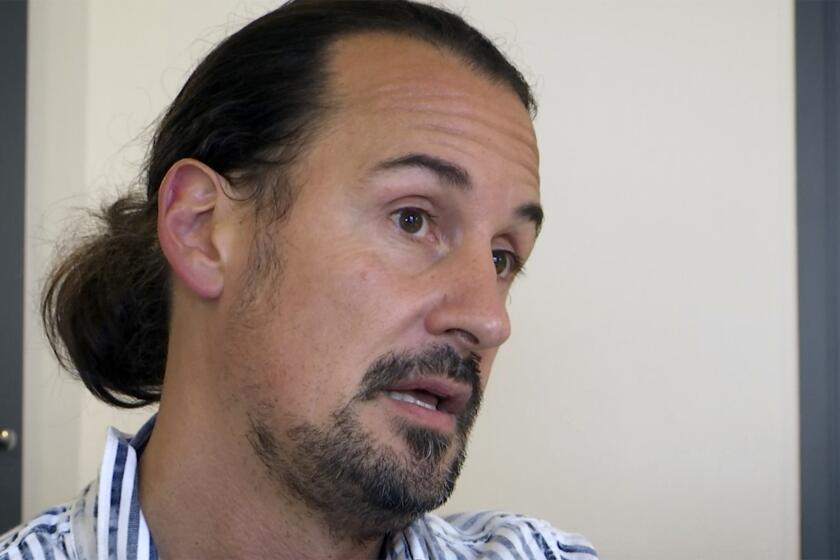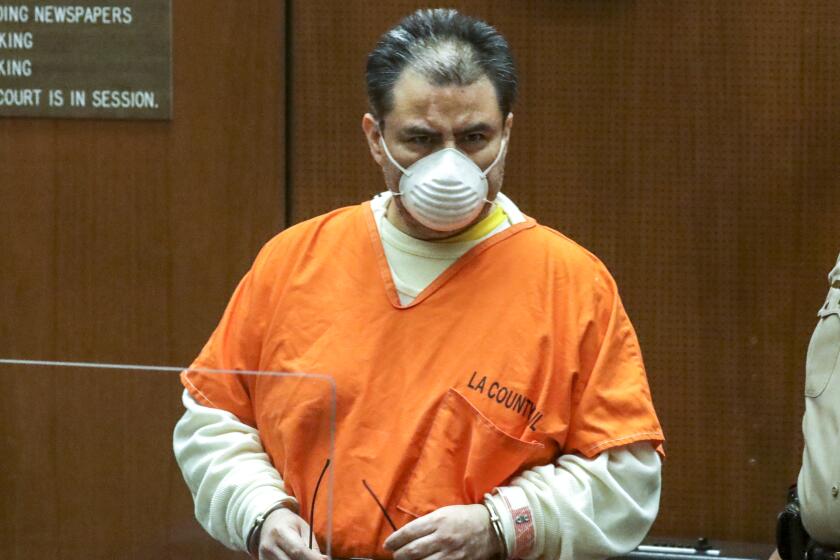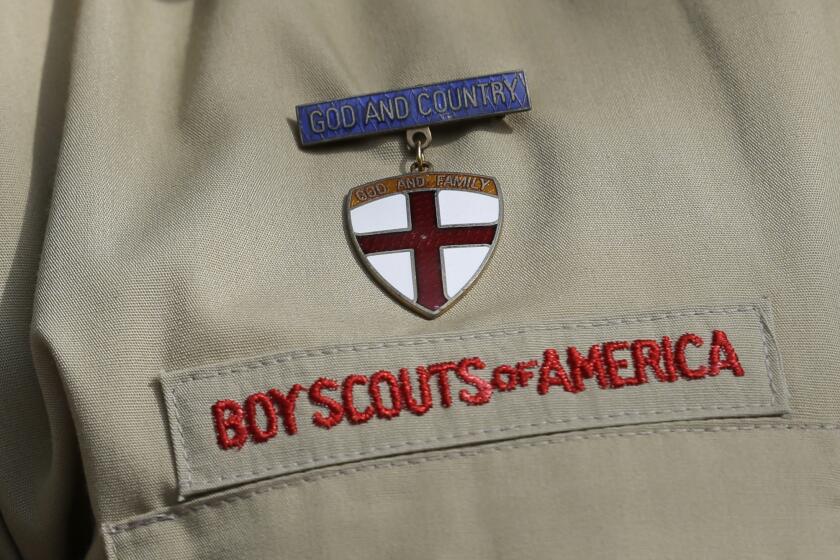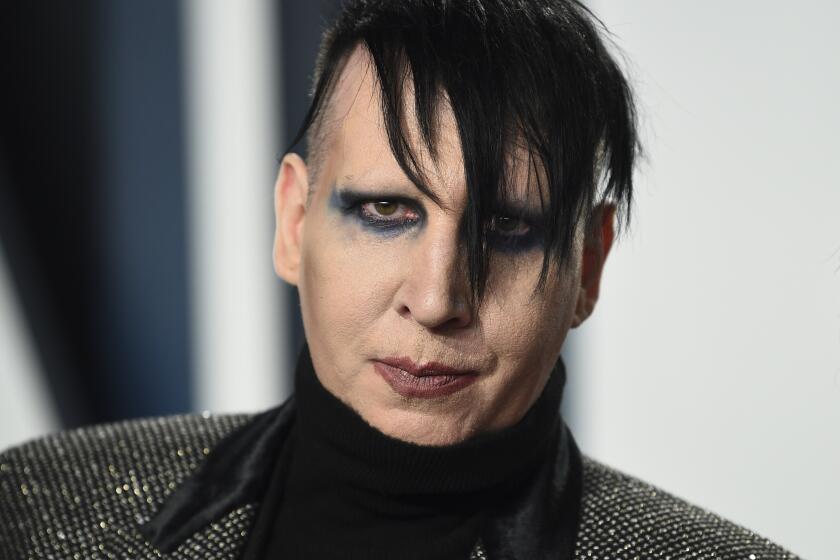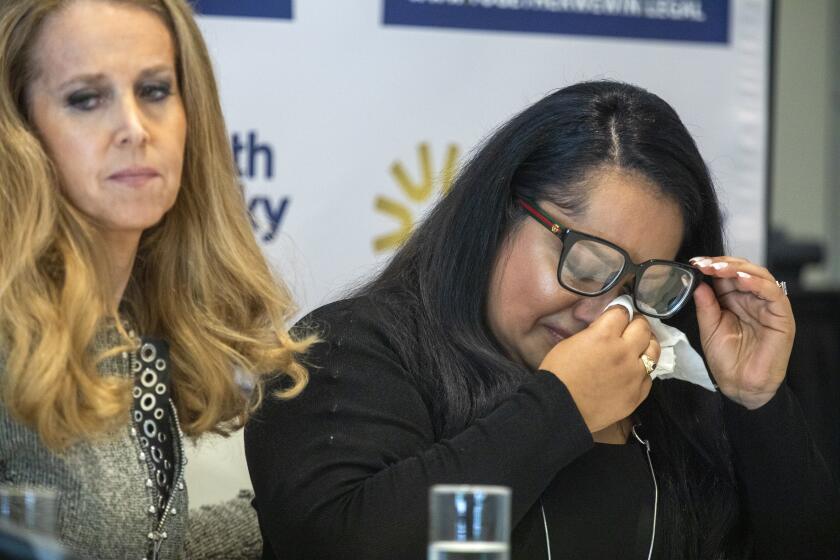Vatican reveals it sanctioned Nobel Prize-winning bishop accused of sexual abuse
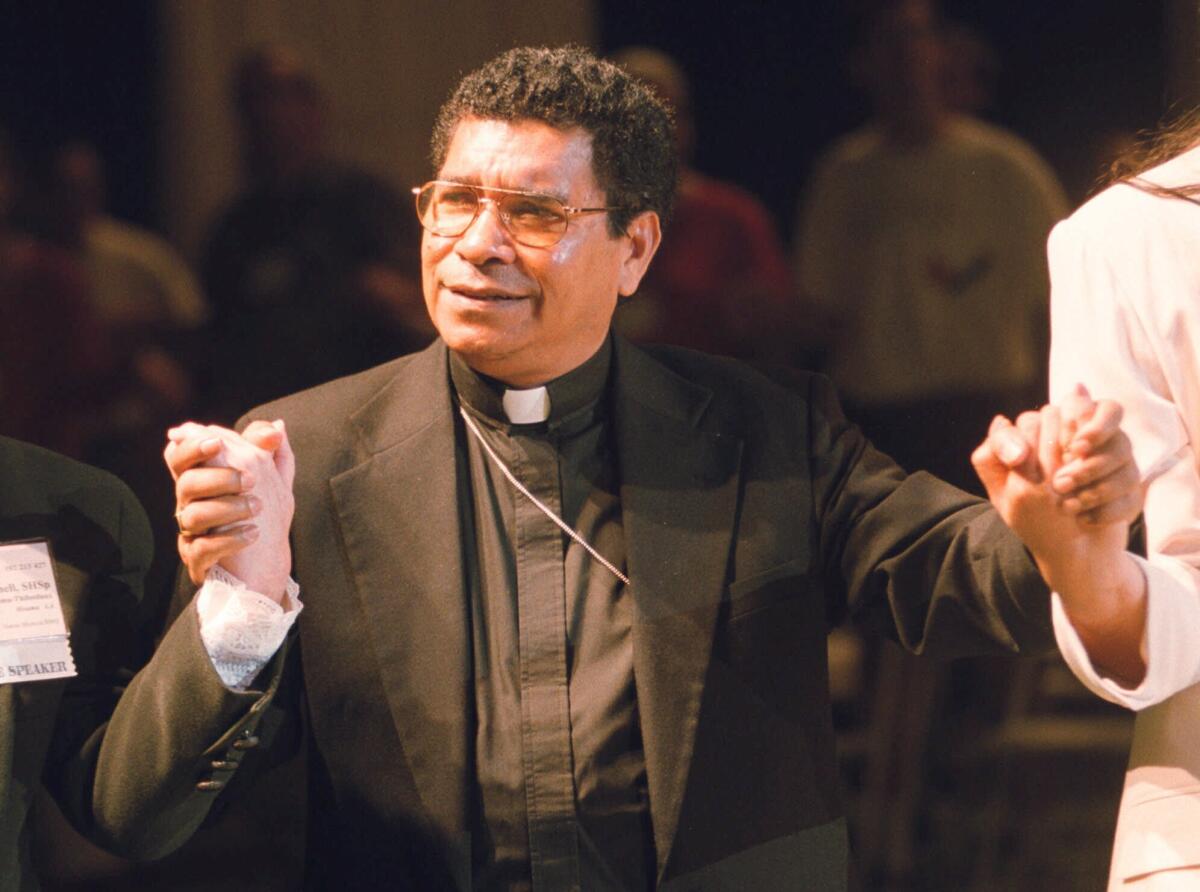
- Share via
VATICAN CITY — The Vatican said Thursday that it had imposed disciplinary sanctions on Nobel Peace Prize-winning Bishop Carlos Ximenes Belo in the last two years, following allegations that he sexually abused boys in East Timor during the 1990s.
The Vatican admission came a day after a Dutch magazine, De Groene Amsterdammer, revealed the accusations against the revered East Timor independence hero, citing two of Belo’s alleged victims and reporting that there were others who hadn’t come forward.
Vatican spokesman Matteo Bruni said the office that handles sex abuse cases received allegations “concerning the bishop’s behavior” in 2019 and within a year had imposed the restrictions. They included limitations on Belo’s movements and exercise of ministry, and a prohibition on voluntary contact with minors or contact with East Timor.
In a statement, Bruni said the sanctions were “modified and reinforced” in November 2021 and that Belo had formally accepted the punishment on both occasions.
The Vatican provided no explanation for why Belo resigned as head of the Roman Catholic Church in East Timor in 2002, two decades earlier than would be expected, and was sent to Mozambique, where he was allowed to work with children.
News of Belo’s behavior sent shockwaves through the heavily Catholic, impoverished Southeast Asian nation, where he is a regarded as a hero for fighting to win East Timor’s independence from Indonesian rule.
An FBI investigation into clerical sex abuse in New Orleans looks specifically at whether priests took children across state lines to molest them.
“We are here also in shock to hear this news,” an official at the archdiocese of Dili, the capital of East Timor, said Thursday, speaking to the Associated Press on condition of anonymity. The official said the archdiocese was unable to provide an official statement without permission from the Vatican.
De Groene Amsterdammer said two alleged victims, identified only as Paulo and Roberto, reported being abused by Belo and said other boys were also victimized. It said its investigation showed that Belo’s abuse was known to the East Timorese government and to humanitarian and church workers.
“The bishop raped and sexually abused me that night,” Roberto was quoted as telling the magazine. “Early in the morning he sent me away. I was afraid because it was still dark. So I had to wait before I could go home. He also left money for me. That was meant so that I would keep my mouth shut. And to make sure I would come back.”
Belo won the Nobel Peace Prize in 1996 with fellow East Timorese independence icon Jose Ramos-Horta for campaigning for a fair and peaceful solution to conflict in their home country as it struggled to gain independence from Indonesia, a former Dutch colony.
A landmark French report says there have been about 330,000 victims of child sex abuse in the Roman Catholic Church in France over the last 70 years.
The Norwegian Nobel Committee, in its citation, praised Belo’s courage in refusing to be intimidated by Indonesian forces. The committee noted that, while trying to get the United Nations to arrange a plebiscite for East Timor, he smuggled out two witnesses of a bloody 1991 massacre so that they could testify to the U.N.’s human rights commission in Geneva.
Ramos-Horta went on to become president of East Timor, a former Portuguese colony in Southeast Asia. Upon his return Thursday from the U.S., where he addressed the U.N. General Assembly, Ramos-Horta was asked about the allegations against his Nobel co-laureate and deferred to the Vatican.
“I prefer to await further action from the Holy See,” he said.
Belo, who is believed to be living in Portugal, didn’t respond when reached by telephone, according to Radio Renascenca, the private broadcaster of the Portuguese church.
Days before jury selection was set to start in the sex abuse trial of the head of La Luz del Mundo church, Naason Joaquin Garcia pleaded guilty to several charges.
Belo is a priest in the Salesians of Don Bosco, a Catholic religious order that has long had influence at the Vatican. The Portuguese branch of the Salesians said in a statement Thursday that it learned “with great sadness and astonishment” of the news. The branch distanced itself from Belo, saying he hadn’t been linked to the order since he took charge in East Timor.
“As regards issues covered in the news, we have no knowledge that would allow us to comment, leaving that to those who possess responsibility and knowledge” of the matter, the statement said.
It said the Portuguese Salesians took Belo in at the request of their superiors after he left East Timor in 2002 and because he was highly regarded, but said he had done no pastoral work.
Belo has a low-profile presence on the Portuguese website of the Salesians, which carried an article from May noting that he attended a 20th anniversary celebration of East Timor’s independence and delivered a greeting. Although the order said it had no links with Belo, he is still listed in the 2021 Vatican yearbook with his Salesian initials, “SDB,” at the end of his name.
Breaking News
Get breaking news, investigations, analysis and more signature journalism from the Los Angeles Times in your inbox.
You may occasionally receive promotional content from the Los Angeles Times.
De Groene Amsterdammer said its research indicated that Belo also abused boys in the 1980s before he became a bishop, when he worked at an education center run by the Salesians.
Neither the Nobel Committee nor the United Nations immediately responded to requests for comment.
Paulo, now 42, told the Dutch magazine that he was abused once by Belo at the bishop’s residence in Dili. He asked to remain anonymous “for the privacy and safety of himself and his family,” the magazine said.
“I thought: This is disgusting. I won’t go there anymore,” the magazine quoted him as saying.
A Delaware bankruptcy judge has approved a $2.46-billion reorganization plan proposed by the Boy Scouts of America to continue operating.
Roberto, who also asked to remain anonymous, said he was abused more often, starting when he was about 14 after a religious celebration in his hometown. Roberto later moved to Dili, where the alleged abuse continued at the bishop’s residence, Groene Amsterdammer said.
It is unclear whether any alleged victims ever came forward to local church, law enforcement or Vatican authorities, or if church officials suspected anything problematic in Belo’s behavior.
Then-Pope John Paul II accepted Belo’s resignation as apostolic administrator of Dili on Nov. 26, 2002, when he was 54 years old, nearly two decades shy of the normal retirement age for bishops. The brief Vatican announcement at the time cited a code of canon law that allows bishops under age 75 to retire for health reasons or for some other “grave” reasons that make them unable to continue as bishop.
In 2005, Belo told UCANews, a Catholic news agency, that he resigned because of stress and poor health and that the newly independent East Timor needed a new church leader.
The investigation into Marilyn Manson by the L.A. County Sheriff’s Department has been sent to Dist. Atty. George Gascón for a decision on whether to file criminal charges against the singer.
Belo had no other episcopal career after that, and Groene Amsterdammer said he moved to Mozambique and worked as a priest there — an unusual transfer for a bishop, especially an internationally celebrated Nobel Peace Prize-winning cleric.
Belo told UCANews he moved to Mozambique after consulting with the head of the Vatican’s missionary office, Cardinal Cresenzio Sepe, and agreed to work there for a year before returning to East Timor. It appears he never returned permanently.
“I am an assistant priest in Maputo. I do pastoral work by teaching catechism to children, giving retreats to young people. I have descended from the top to the bottom,” UCANews quoted Belo as saying.
Efforts to reach Sepe, who is now retired, were not successful.
The University of California will pay $374 million to settle more sexual abuse suits involving UCLA gynecologist James Heaps, bringing total to $700 million.
By 2002, when Belo retired as head of the church in East Timor, the clerical sex abuse scandal had just exploded publicly in the U.S. and the Vatican had just begun to crack down on abusive priests, requiring all cases of abuse to be sent to the Vatican’s Congregation for Doctrine of the Faith for review.
Bishops, however, were exempted from that requirement and regularly got a pass on any Vatican sanction. Only in 2019 did Pope Francis pass a church law requiring abuse and sexual misconduct against bishops to be reported internally, and providing a mechanism to investigate the claims.
It is possible that Belo’s alleged sexual activity with teens might have been dismissed by the Vatican in the early 2000s if it involved 16- or 17-year-olds, since the Vatican in those years considered such activity to be sinful but consensual, and not abuse. Only in 2010 did the Vatican raise the age of consent to 18.
The Catholic Church wields enormous influence in East Timor but has had its brushes with scandal. Last year, a defrocked American priest, Richard Daschbach, was found guilty by a Dili court of sexually abusing orphaned and disadvantaged young girls under his care and was sentenced to 12 years in prison, the first such case of its kind in the country.
Like Belo, Daschbach had been revered for his role during the tiny Southeast Asian nation’s fight for independence, and went on trial still with the support of powerful officials. Former President Xanana Gusmao came to court the day Daschbach was convicted.
More to Read
Sign up for Essential California
The most important California stories and recommendations in your inbox every morning.
You may occasionally receive promotional content from the Los Angeles Times.
